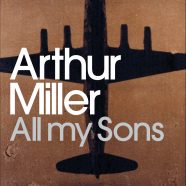All My Sons
Arthur Miller took two-and-a-half years to write “All My Sons.” Its creation straddled the end of the Second World War and the inspiration came from his mother-in-law. In the original story a woman informed on her father who had defrauded the military. Miller made the daughter a son, Chris Keller.
The story tells of Joe Keller, an armaments producer, who knowingly supplies faulty engine parts to the American Air Force during the war that results in the deaths of twenty-one pilots. Joe allows his neighbour, friend and colleague Steve Deever to take the blame. Deever is disgraced and neither of his children, neither Ann nor George, will acknowledge him.
Kate and Joe Keller’s son Larry is missing, presumed dead. It’s been three years, yet his mother refuses to accept the truth; but her reasons are more than mere motherly love. The arrival in town of Larry’s love interest Ann leads to a crisis that threatens to destroy the Kellers. George Deever, her brother, has recently visited his father in prison and objects to plans for Chris and Ann to marry.
Miller’s story is an agonising tale about how people will deny the truth in order to survive. It explores the ugly, exploitative practices of industrialists and how family is used as an excuse for criminality. Everybody, it seems, shares in the blame, though to different extents.
The example of “All My Sons” may well represent myriad other cases of people’s contempt for the soldiers fighting and dying for vague ideals in far-flung regions, out of sight of the means of production and the day-to-day consumerism of American society. Chris Keller says “there was no meaning in [the war] here; the whole thing to them was a kind of a – bus accident.” He returns to a country where “[he] felt wrong to be alive, to open the bank-book, to drive the new car, to see the new refrigerator.” His father says he did it for him but Chris asks, “Don’t you have a country? Don’t you live in the world?”
The play asks us, much like Yeats did with “September 1913,” what we are willing to fight and die for – money or ideals? The real question is whether or not that is hopelessly naive in an increasingly consumerist world.
R.H.






